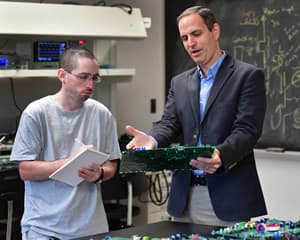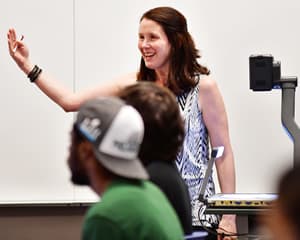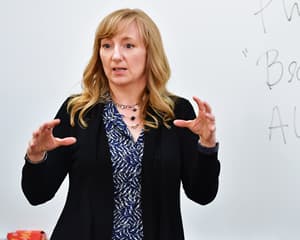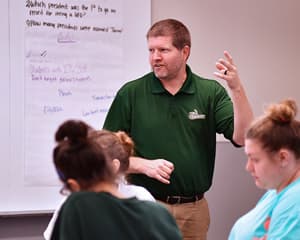Five finalists announced for University’s top teaching award

Robert Cox, Celine Latulipe, Heather Perry, Drew Polly and Tony Schmitz are the 2018 finalists for the Bank of America Award for Teaching Excellence, one of UNC Charlotte’s most prestigious honors.
Cox, an associate professor of electrical and computer engineering, believes it is his “role as an educator to develop students into problem solvers.”
 Whether teaching undergraduate or graduate courses, Cox strives to create solid, fundamental engineers by instilling three pedagogical goals: an understanding of the importance of physical modeling, an understanding of how to design and build systems and the development of physical intuition.
Whether teaching undergraduate or graduate courses, Cox strives to create solid, fundamental engineers by instilling three pedagogical goals: an understanding of the importance of physical modeling, an understanding of how to design and build systems and the development of physical intuition.
Asis Nasipuri, chair of the Electrical and Computer Engineering Department in the Lee College of Engineering, said during Cox’s 12 years at UNC Charlotte, he has given “the highest priority to his students and routinely spends unconventional amounts of time for classroom preparation … to give them the best value for their time on campus.”
According to a recent senior, Yolimar McCombs, “Dr. Cox shows great enthusiasm and professionalism while teaching in and out of the classroom. During class, it is very easy to become aware of how much passion he has for the subjects and [is] a great asset to the Lee College of Engineering.”
Latulipe, a professor in the Department of Software and Information Systems, College of Computing and Informatics, has a teaching philosophy centered on creating an environment in which students construct their own understanding. To achieve this, she “flips” her classroom, requiring students to consume content outside of class so that they come into class prepared to actively engage in the material. She organizes students into teams to encourage peer learning.
 “We all learn better when we learn together, and when we do so, we simultaneously build the conditions for a better world,” said Latulipe. This innovative educational approach served as one of the core foundations of the Connected Learner proposal, which was awarded a $2 million grant from the National Science Foundation.
“We all learn better when we learn together, and when we do so, we simultaneously build the conditions for a better world,” said Latulipe. This innovative educational approach served as one of the core foundations of the Connected Learner proposal, which was awarded a $2 million grant from the National Science Foundation.
As a mentor, Latulipe guides research students in novel and interdisciplinary ways to pursue research at the intersection of art and technology with a focus on creativity and design. Graduate student Johanna Okerlund stated Latulipe “actively embodies inclusivity and works to make the spaces she is involved in safer, more equitable, inclusive and fair.”
Perry, an associate professor of history in the College of Liberal Arts & Sciences, stated two pedagogical ideas remain at the heart of her approach to teaching: “Learning how to do something completely new is hard work, and orchestrating that kind of brand-new learning is even harder.”
 She believes her primary role as an educator is to negate the common misconception that a student’s success in a college level history course “hinges on having a photographic memory, a nifty mnemonic device, or a case of Red Bull and the sheer will to stay up all night memorizing everything.”
She believes her primary role as an educator is to negate the common misconception that a student’s success in a college level history course “hinges on having a photographic memory, a nifty mnemonic device, or a case of Red Bull and the sheer will to stay up all night memorizing everything.”
Instead, Perry cultivates historical skills in all of her students that allow them to develop an “extremely versatile and coveted skillset.”
Former student Pooja Pasupula stated, “Dr. Perry went well above and beyond with the class, especially with the impact it would have on its students. She specifically taught the material in a way that would push us to gain the mental growth to achieve in not only her class but in any class at the University we choose to take.”
Polly, professor of reading and elementary education in the Cato College of Education, said his teaching philosophy is guided by three primary themes: a learner-centered curriculum and pedagogy where students are actively engaged, have ownership of their learning and engage in activities based on their needs and interests; a rigorous curriculum that requires them to apply content directly in the context of practice, utilizing higher-order thinking skills; and experiences directly informed by and connected to the work being conducted in public schools.
 “I believe learning is an ongoing process that occurs by personalizing and making sense of concepts and knowledge that people encounter through meaningful experiences,” said Polly. “Sometimes a lot of the learning process occurs as individuals apply their new knowledge and skills in situations or activities. In the field of education, specifically teaching future teachers, this point is critical.”
“I believe learning is an ongoing process that occurs by personalizing and making sense of concepts and knowledge that people encounter through meaningful experiences,” said Polly. “Sometimes a lot of the learning process occurs as individuals apply their new knowledge and skills in situations or activities. In the field of education, specifically teaching future teachers, this point is critical.”
Georgia Walker, a senior majoring in elementary education, stated of Polly, “Having professors that invest in learning empowers students for their future career.”
Schmitz, a professor in the Lee College’s Mechanical Engineering and Engineering Science Department, has taught 10 different courses at the undergraduate and graduate level. He said his role in every course is to “train decision makers not problem solvers.” An example of this self-described, paradigm-shifting pedagogy can be found in his Junior Design course in which he explains to students: “Design requires creativity, and there is not just one correct answer.”
 This pedagogical outlook has created an engaging environment for students to participate in collaborative learning, and as a team, to solve challenging, open-ended problems.
This pedagogical outlook has created an engaging environment for students to participate in collaborative learning, and as a team, to solve challenging, open-ended problems.
His level of dedication to teaching and learning is best summed up by current graduate student, Christoph Kossack, who stated, “Seldom do we have the pleasure to be taught by a professor who invests so much time and effort to ensure that his students truly understand the material that he is teaching them. It is this kind of investment in his students that makes them feel motivated and encourages them to strive for more.”
A celebration honoring the finalists for the Bank of America Award for Teaching Excellence is scheduled for Friday, Sept. 7; the award recipient will be announced at this event.
The Bank of America Award for Teaching Excellence, first presented in 1968, recognizes outstanding faculty members at UNC Charlotte. It was established in response to a suggestion by the staff of the student literary magazine. Bonnie E. Cone and W. Hugh McEniry, vice chancellors at the time, endorsed the students’ proposal for the annual award and presented it to Chancellor Dean Colvard. He found financial support for the award through the generosity of Addison Reese and NCNB, a predecessor to NationsBank and Bank of America.